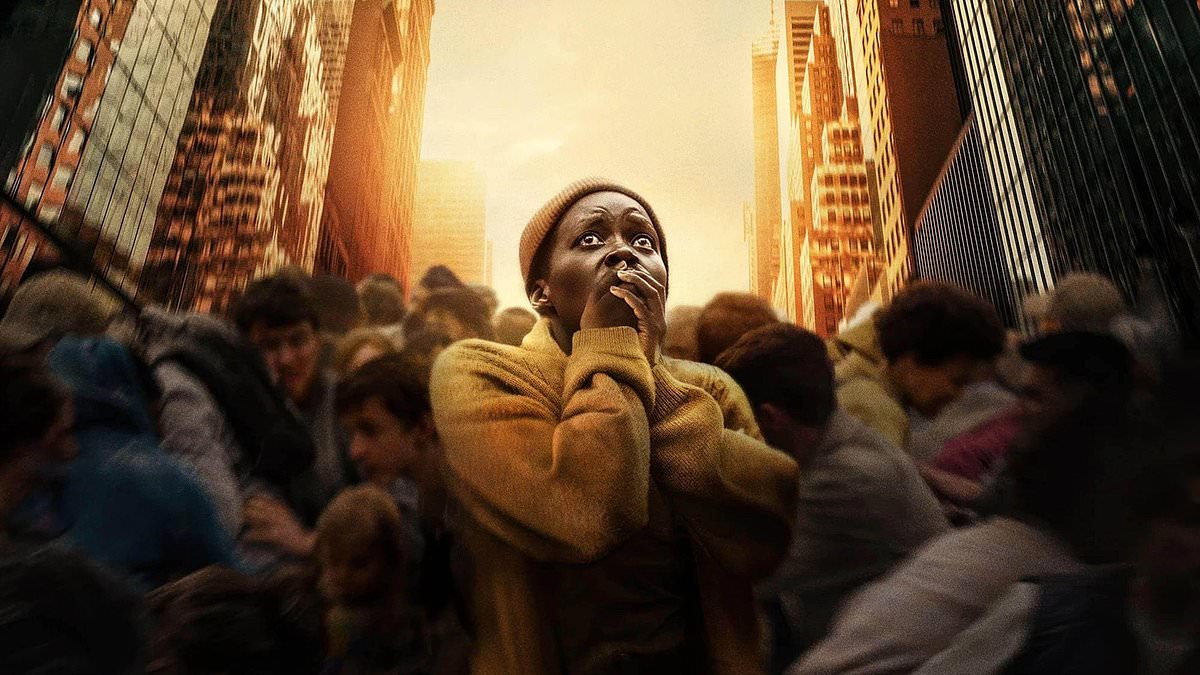Verdict: Silence is golden
The need to keep quiet, the notion that silence is golden, resonates with us all. That’s partly why the 2018 apocalyptic thriller A Quiet Place was such a triumph: it tapped into that collective childhood memory of stern teachers or parents warning us not to make a peep, and added monsters.
Yet I arrived at Cineworld Leicester Square this week wondering whether the premise could sustain a second spin-off after 2020’s excellent A Quiet Place: Part II. It does, magnificently.
This is one of the finest films of the year so far: taut, touching, exquisitely crafted by writer-director Michael Sarnoski (taking over from the story’s creator John Krasinski, who is among the producers), and superbly led by Lupita Nyong’o.
She plays Sam, who at the start of the film is a cancer patient at a hospice, only grudgingly coming to terms with her impending death, furious with the world for stealing her life. A male nurse is the nearest she has to a human friend, though she does have a devoted companion, a cat.

This is one of the finest films of the year so far: taut, touching, exquisitely crafted by writer-director Michael Sarnoski

The need to keep quiet, the notion that silence is golden, resonates with us all
The apocalypse strikes while she and her fellow patients are on a day trip into Manhattan. Sam is desperate to eat a proper New York pizza, perhaps for the final time, but soon she has a lot more on her plate.
An alien invasion is underway, but the city’s terrified inhabitants quickly work out that their deadly assailants are blind, with extra-sensory hearing.
One way or another, childhood memories loom large over this film, so here’s another of mine: in the Jennings books I adored as a boy, formidable prep school teacher Mr Wilkins was blessed with what the pupils called ‘supersonic ear-sight’.
That’s what these creatures have. Make a sound and they will find you. Noise is fatal.
This is the set-up that we’ve seen twice before, but Sam’s terminal illness gives it an intriguing added dimension. Will this world-weary woman, with so much to be weary about, now dig out the instincts to survive?

It taps into that collective childhood memory of stern teachers or parents warning us not to make a peep, and added monsters
At first this seems to be the existential paradox at the heart of the movie but, brilliantly, it finds a different gear.
As a multitude of scared, bedraggled people shuffle noiselessly towards the harbour and possible salvation, Sam battles against the tide. She craves one last pizza from a particular Harlem pizzeria, a precious connection with her past.
But on the way she encounters a needy Englishman (Joseph Quinn of Stranger Things fame, also wonderful), who, much to her initial frustration, won’t let her go.
They become an unlikely pair, with him finding unexpected courage, and her just as unexpectedly thriving on the support of a fellow human being, though of course she still has her cat. And that’s another thing. One misplaced mew and they’re all toast. The cat, you might say, is a ticking time-tom.
It’s gripping stuff, immaculately choreographed and paced. At 99 minutes, if anything, A Quiet Place: Day One under-stays its welcome. Film-making of this quality can afford to linger, but then one of the reasons it’s so good is that it doesn’t.
Horizon: An American Saga — Chapter 1 (15, 181 mins)
Verdict: Stretches endlessly
The same can most certainly not be said of Horizon: An American Saga — Chapter 1.
Kevin Costner’s bloated, incoherent mess of a Civil War-era Western lasts three unwieldy, unrewarding hours, with Chapters 2, 3 and reportedly even 4 yet to torment us.
Costner has form. His 1990 epic Dances With Wolves also weighed in at three hours, and The Postman (1997) is so long that if you sit through it at home, the real postman will make at least three deliveries before it’s over.
Or so it will seem. On the other hand, Costner also knows his way around a Western, from both sides of the camera.
Dances With Wolves had plenty of virtues and Open Range (2003), a mere 139 minutes long, was excellent.

Pictured: Kevin Costner in a scene from “Horizon: An American Saga-Chapter I

Pictured: Luke Wilson in a scene from “Horizon: An American Saga-Chapter I
So when word began to circulate that he had raised some $40m of his own money and mortgaged his house to fund this long-cherished project (we should all get to make such financial sacrifices), folk at least expected him to get the story-telling bit right.
Sadly, he doesn’t. The titular Horizon is a fledgling frontier town way out West, and the story follows the various people who, for whatever reason, intend to make it their home.
As a premise that sounds perfectly dandy, but perhaps much more suited to a multi-episode TV series, which is what, if anything, this should have been.
Apart from the visual clichés (no distant escarpment is free of an Apache warrior, casting an ominous eye over the wagon train below), the film is stuffed with storylines that you expect to intersect but don’t.
This narrative clunkiness is a waste of fine actors such as Sam Worthington, who plays a soldier trying to reconcile his irreproachable moral rectitude with the hots for a gorgeous homesteader (Sienna Miller), widowed in a brutal Apache raid.
Then there’s Costner himself as the obligatory enigmatic drifter, lightning-quick on the draw of course, whose compassion for a much younger prostitute at one point leads her gratefully to straddle him just to help the poor old fellow nod off after a tiring day — a far more pleasurable sleep-aid than this interminable picture.
Both films are in cinemas now.
